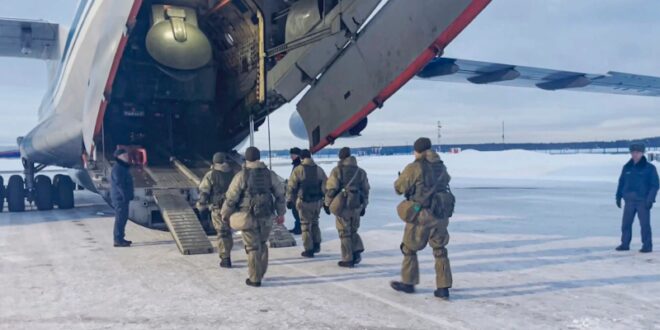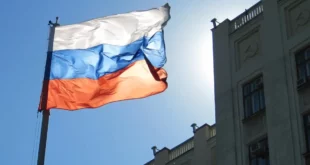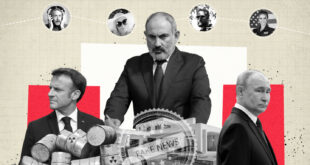Kazakh President Qasym-Zhomart Toqaev says troops from the Russian-led Collective Security Treaty Organization (CSTO) will begin withdrawing from Kazakhstan in two days as the situation calmed following the deadliest violence in the ex-Soviet republic’s three decades of independence from Moscow.
In a televised address to parliament on January 11, Toqaev said the CSTO troops will complete their withdrawal over the next 10 days now that order has been largely restored.
Meanwhile, Russia’s Defense Ministry said two of its Il-76 military transport planes arrived in Moscow on January 11 after leaving from the airport in Kazakhstan’s largest city, Almaty.
The ministry said each plane was carrying 145 Russian citizens. It also said that the repatriation of Russia citizens from Kazakhstan “will continue until the task is implemented in full.”
The CSTO military contingent arrived in Kazakhstan last week after the leadership of the oil-rich country asked the Russian-led bloc for military assistance when protests sparked by a fuel price hike turned deadly with security personnel and mobs clashing on city streets nationwide.
Toqaev claimed that “foreign-trained terrorists” were behind the protests in an attempt to overthrow the government. But analysts say there appears to be an internal power struggle between the president and followers of former leader Nursultan Nazarbaev, who has remained a powerful figure in the country since handpicking Toqaev as his successor in 2019.
Human rights experts from the United Nations on January 11 called on the Kazakh authorities to halt their “unrestrained use of force, including lethal force, against protesters.”
Fionnuala Ni Aolain, the UN’s special rapporteur on counterterrorism and human rights, said in a statement that Kazakhstan’s overly broad use of the term “terrorism” to describe protesters, civil society activists, human rights defenders, journalists, and political parties “appeared aimed at instilling fear and was deeply concerning.”
Other UN rights experts also expressed concern that Toqaev had given orders for his security forces and army to “open fire with lethal force” against protesters that he described as “bandits and terrorists.”
The UN rights experts also called for “independent and human-rights-based investigations of state use of force against protesters” in Kazakhstan.
Toqaev on January 11 suggested for the first time that there was an internal power struggle in Kazakhstan, saying that “under the country’s first president, very lucrative companies and internationally known rich people appeared.”
“The time has come to give people what belongs to them, to provide help systemically. The government must look into such companies to define what their contributions to the For Kazakhstan’s People Fund should be,” he said, chiding the nation’s oligarchs who have “diminished competition” in the country.
In a major move targeting people around Nazarbaev, Toqaev also ordered the government to shut down operations of Operator ROP, a major disposal and recycling company that many in Kazakhstan says is connected to Nazarbaev’s youngest daughter, Alia Nazarbaeva.
Toqaev on January 11 nominated Alikhan Smailov for the post of prime minister, a move that lawmakers approved hours later in parliament.
Smailov, 49, served as first deputy prime minister in the previous cabinet which Toqaev dismissed last week as the country was engulfed in unprecedented protests that turned violent and left at least 163 people dead.
Later in the day, Toqaev’s office issued a presidential decree appointing a new government, which saw some former cabinet members, including the interior minister, defense minister, and foreign minister, retain their posts,
Deputy Prime Minister Roman Sklyar was promoted to the post of the first deputy prime minister, while the ministers of information, justice, health, industry, economy, culture, finance, and energy were replaced.
Kazakhstan was thrown into turmoil in the past week after protests in the remote western region of Manghystau over a sharp hike in the price of liquefied petroleum gas (LPG) spread across the country all the way to Almaty.
What morphed into peaceful protests against wider economic and political grievances erupted into a spasm of violence, with mobs ransacking and torching public buildings and stores in Almaty, the commercial capital of 1.8 million people, and elsewhere.
The head of the Almaty City Health Directorate, Nariman Tabynbaev, told reporters on January 11 that during the violence more than 1,200 people visited medical facilities for assistance because of injuries they had suffered.
“Some 176 individuals are currently in hospitals [in Almaty], of whom 18 are in intensive care units, including three children,” Tabynbaev said, adding that most of the hospitalized patients had suffered gunshot wounds.
The Interior Ministry said on January 11 that security forces have detained 9,900 people in connection with the deadly unrest.
So far, authorities have failed to produce solid evidence to support claims that “terrorists,” including “foreign fighters,” were behind the unprecedented protests in the authoritarian country. Some have blamed government forces for fueling the violence.
In the face of a mounting crisis, Toqaev declared a state of emergency on January 5 and called on the CSTO to deploy troops to help maintain security.
At the same time, he dismissed his cabinet and removed the 81-year-old Nazarbaev as head of the National Security Council, a powerful position from which the longtime leader continued to exert considerable influence.
Toqaev also dismissed the head of th National Security Committee (KNB), longtime Nazarbaev ally Karim Masimov, then had him arrested for high treason. Several other security officials were also detained.
Toqaev sought to reassure citizens that he was working toward economic stability, ordering the central bank and the financial regulations agency to ensure foreign exchange market stability in order to build confidence in the local currency, the tenge.
 Eurasia Press & News
Eurasia Press & News




